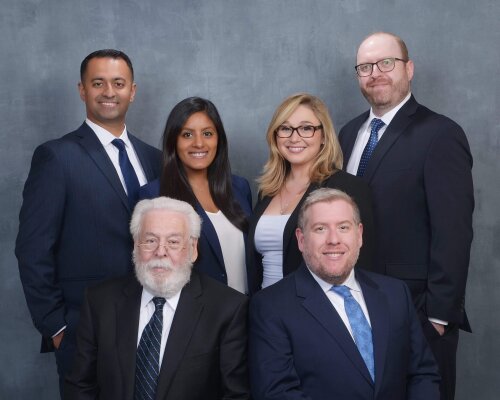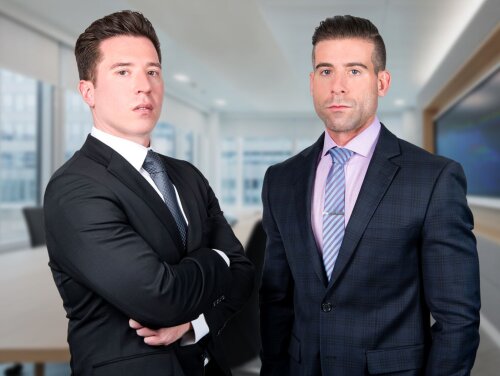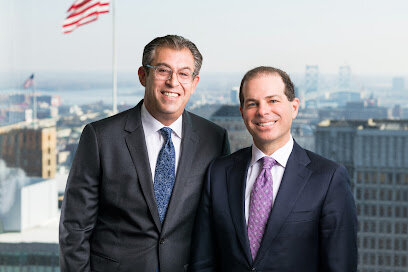Best Defamation Lawyers in Philadelphia
Share your needs with us, get contacted by law firms.
Free. Takes 2 min.
List of the best lawyers in Philadelphia, United States
About Defamation Law in Philadelphia, United States
Defamation is a civil wrong that involves a false statement presented as fact that harms a person or entitys reputation. In the United States defamation law is shaped by federal constitutional protections for freedom of speech and state law causes of action. In Philadelphia defamation claims are brought under Pennsylvania law and decided in state courts, typically the Philadelphia County Court of Common Pleas for local matters. Defamation generally comes in two forms - libel, which refers to written or permanently recorded false statements, and slander, which refers to spoken false statements. Whether a statement is actionable depends on factors such as falsity, publication to a third party, fault by the speaker, and resulting harm.
Why You May Need a Lawyer
Defamation cases can be legally complex because they require balancing reputation protection against First Amendment speech rights. You may need a lawyer if you are dealing with any of the following situations:
- You have been the subject of a false statement that damages your personal or professional reputation and you want to explore legal remedies.
- You are a public official, public figure, or private individual and need an assessment of the applicable fault standard and potential evidence requirements.
- A defamatory statement about you has been posted online on social media or a third-party website and you need help navigating takedown requests, Section 230 issues, or the possibility of suing the original poster.
- You received a demand letter alleging you made defamatory statements and you need defense strategy to avoid or respond to a lawsuit.
- You seek an injunction to halt continuing defamatory publication or to remove false content that is causing immediate harm.
- You want to negotiate a retraction, correction, or settlement and need legal counsel to draft or review documents and protect your interests.
- You want help proving damages, preserving evidence, or preparing for trial when complex issues like actual malice or special damages are involved.
Local Laws Overview
Key points about defamation law that apply in Philadelphia include:
- State law governs most defamation claims. Pennsylvania law provides the substantive framework for proving defamation, including elements such as falsity, publication, fault, and damages.
- Statute of limitations. Pennsylvania generally requires defamation claims to be filed within a relatively short period. Claimants must act quickly to preserve their rights because delayed action can bar a claim.
- Public figure and public official standard. If the plaintiff is a public official or public figure the constitutional "actual malice" standard applies. That means the plaintiff must prove the defendant published the statement knowing it was false or with reckless disregard for the truth.
- Private plaintiffs. Private individuals usually face a lower fault standard than actual malice. The required showing may be negligence or another state-specific standard depending on the facts.
- Truth as a defense. Truth is a complete defense to defamation. If the defendant can prove the statement was substantially true the claim will fail.
- Privileges. Certain statements are protected by absolute or qualified privileges. Absolute privileges apply to some official proceedings and statements; qualified privileges may apply to reports, fair comment, or communications made in certain contexts, but can be lost if abused.
- Online speech and platforms. Federal law - notably Section 230 of the Communications Decency Act - often shields interactive online platforms from liability for third-party content, though the original speaker of defamatory content can still be liable.
- Remedies. Plaintiffs can seek monetary damages for economic and non-economic harm, presumed damages in certain categories of defamatory statements, punitive damages in cases involving malice, and injunctive relief in some circumstances.
- Local court procedures. Defamation lawsuits in Philadelphia follow Pennsylvania civil procedure. Local practices such as pre-suit demands, motion practice, and discovery can affect strategy and timing.
Frequently Asked Questions
What exactly counts as defamation?
Defamation is a false statement of fact, communicated to at least one person other than the plaintiff, that harms the plaintiffs reputation. Statements of opinion, rhetorical hyperbole, or truthful statements are generally not actionable as defamation.
What is the difference between libel and slander?
Libel refers to defamatory statements in writing or other permanent form, such as printed words, photographs, or online posts. Slander refers to defamatory statements made orally. Libel is often easier to prove because the statement is recorded, but both can be actionable if other elements are met.
How long do I have to file a defamation lawsuit in Philadelphia?
Pennsylvania law imposes a relatively short statute of limitations for defamation claims. You should consult an attorney promptly because delays can result in losing the right to sue. Acting quickly also helps preserve relevant evidence such as web pages and witness statements.
Do I need to be a public figure to sue for defamation?
No. Private individuals can sue for defamation. However public officials and public figures face a higher burden of proof and must show actual malice - that the defendant knew the statement was false or acted with reckless disregard for the truth.
Is truth always a defense to a defamation claim?
Yes. In general truth is a complete defense in defamation litigation. If the defendant proves the substance of the statement is true the claim will fail. Context and accuracy of the statement may matter.
Can I sue an online platform for defamatory user content?
Often the platform itself is protected under federal Section 230 law which shields interactive computer services from liability for third-party content. However the actual author of the false statement can be sued. It may be possible to subpoena user information from platforms if the author needs to be identified, subject to legal standards and platform policies.
What damages can I recover if I win a defamation case?
Recoverable damages can include compensatory damages for lost income and emotional harm, special damages for provable economic loss, presumed damages in certain types of defamation, and punitive damages where the defendant acted with malice. The availability and amount of damages depend on case specifics and proof.
Should I send a retraction demand or a cease-and-desist letter?
Sending a retraction demand or cease-and-desist letter can be a useful first step to seek correction and potentially limit damages. However such correspondence should be drafted carefully because it may trigger a legal response. Consulting an attorney before sending significant demands is wise.
Can I sue for an opinion I believe is damaging?
Pure opinions are typically protected speech and are not actionable. Statements that imply undisclosed factual allegations or assertions that can be proven true or false may be considered defamatory. Whether a statement is opinion or fact often depends on context and wording.
Is defamation a criminal offense in Pennsylvania?
Defamation is primarily a civil matter in the United States. Criminal defamation laws exist in a few jurisdictions but are rarely used and raise constitutional concerns. In Pennsylvania defamation claims are generally pursued as civil lawsuits rather than criminal prosecutions.
Additional Resources
When you need more information or assistance consider these local and national resources:
- Philadelphia County Court of Common Pleas - civil court where local defamation matters are filed and litigated.
- Philadelphia Bar Association - offers lawyer referral services and can help you find attorneys experienced in media law and defamation.
- Pennsylvania Bar Association - statewide bar organization with resources on civil litigation and attorney directories.
- Community Legal Services of Philadelphia and other local legal aid groups - may provide help or referrals for qualifying individuals.
- First Amendment advocacy organizations and media law clinics at local law schools - useful for complex constitutional questions.
- Philadelphia Law Libraries and the Pennsylvania Unified Judicial System for court procedure and filing rules.
Next Steps
If you believe you have been defamed or youve been accused of defamation follow these practical steps:
- Preserve evidence. Save screenshots, emails, recordings, witness names, dates, and any copies of the alleged defamatory material. Web pages can disappear quickly so act immediately.
- Do not engage impulsively. Public back-and-forths can worsen the situation and create additional evidence that may be harmful in litigation.
- Consider a narrowly tailored retraction or correction demand drafted or reviewed by an attorney to seek remediation without escalating to litigation.
- Consult a lawyer experienced in defamation and First Amendment law to evaluate your case - including fault standards, damages, likely defenses, procedural deadlines, and jurisdictional issues.
- Discuss fee structures and case strategy. Ask potential attorneys about their experience with online defamation, media defendants, and local Philadelphia practice.
- Explore alternative dispute resolution. Many defamation disputes are resolved through negotiation, retraction, mediation, or settlement rather than full trial.
- If immediate harm is occurring ask your attorney about emergency relief options such as temporary restraining orders or expedited discovery to identify anonymous speakers.
Early consultation with knowledgeable local counsel will help you understand your rights, the strength of your claim or defense, and the most practical and cost-effective path forward in Philadelphia.
Lawzana helps you find the best lawyers and law firms in Philadelphia through a curated and pre-screened list of qualified legal professionals. Our platform offers rankings and detailed profiles of attorneys and law firms, allowing you to compare based on practice areas, including Defamation, experience, and client feedback.
Each profile includes a description of the firm's areas of practice, client reviews, team members and partners, year of establishment, spoken languages, office locations, contact information, social media presence, and any published articles or resources. Most firms on our platform speak English and are experienced in both local and international legal matters.
Get a quote from top-rated law firms in Philadelphia, United States — quickly, securely, and without unnecessary hassle.
Disclaimer:
The information provided on this page is for general informational purposes only and does not constitute legal advice. While we strive to ensure the accuracy and relevance of the content, legal information may change over time, and interpretations of the law can vary. You should always consult with a qualified legal professional for advice specific to your situation.
We disclaim all liability for actions taken or not taken based on the content of this page. If you believe any information is incorrect or outdated, please contact us, and we will review and update it where appropriate.












